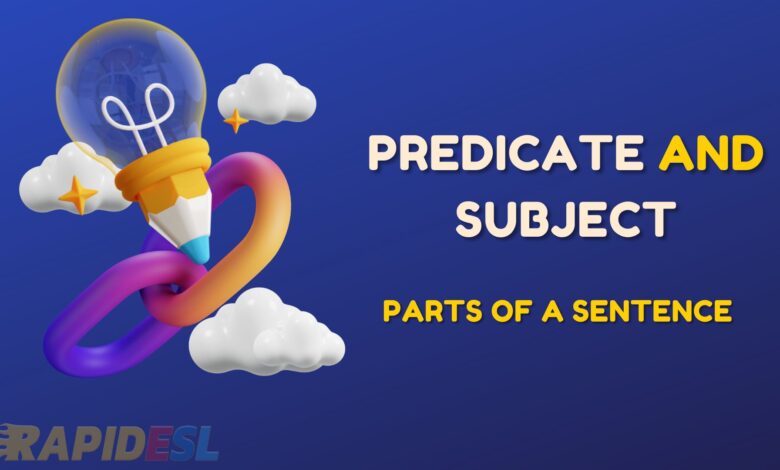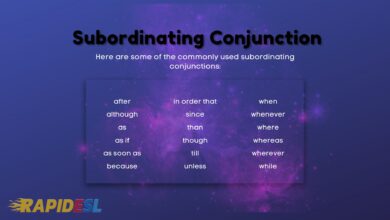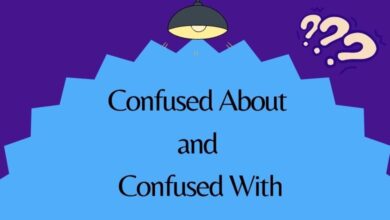
Subject and Predicate Exercises!
What is a Subject?
A subject is like the star of a sentence – it’s the one doing the action or the main focus. When a sentence starts, the subject usually comes first, which makes it easy to find. Look at this example:
- The cat chased the mouse.
Here, the subject doing the chasing is “the cat.” Even when there are two things in the sentence, the subject is still the one doing the action. If someone is causing something to happen, they’re the subject:
- Mom baked cookies.
In this sentence, “Mom” is the one doing the baking. Remember, the subject is the doer or the main character in a sentence!
Subjects Examples in Command
This means we’re going to look at sentences that give directions or orders. These sentences often begin with a verb and don’t always mention the subject explicitly. Instead, the subject is usually understood to be “you,” the person receiving the command. Here are a couple of examples to help you understand:
- Close the door. In this command, the subject is implied to be “you.” The complete sentence would be “You, close the door.”
- Turn off the lights. Again, the subject is implied to be “you.” The full sentence would be “You, turn off the lights.”
- Read the book. Once more, the subject “you” is implied. The sentence can be expanded to “You, read the book.”
Remember, even if the subject isn’t explicitly stated, it’s usually understood to be “you” in command sentences. This is a common and important concept to grasp when learning English!
Subjects Examples in Passive Voice
Passive voice appears in sentences that describe an action in a more passive or indirect way. Often, the word “by” is used, and the entity performing the action is placed at the end of the sentence instead of the beginning.
This might be puzzling for a few reasons. To start, the one performing the action is not always explicitly stated. Additionally, the entity that has experienced the action becomes the subject. Consider this illustration:
- The cake was baked by the chef.
In this instance, the individual responsible for the action is the chef. However, due to the sentence’s structure, the subject is the cake. You can pinpoint the subject by asking who or what the verb relates to.
Alternatively, you can imagine that the doer of the action is omitted from the sentence. In that scenario, the linking verb (am, is, are, was, were, be, being, been) becomes the action. The initial noun becomes the subject because it carries out the action of “being” something. Look at this example:
- The book was read.
In this sentence, it’s unclear who read the book. We might infer it was a reader, but the sentence itself doesn’t specify. Moreover, it’s not a command. There’s no implied “you” as the subject. Nevertheless, the sentence remains complete. In this type of sentence, the entity or object that exists becomes the subject.
What is a Predicate in English Grammar?
The predicate in a sentence is the part that contains the action or the information about what the subject is doing. It includes all the details related to the action and the objects affected by it. Let’s explore this concept with different examples:
- Sentence with Active Voice:
- Subject: Mary
- Predicate: likes to run at the public park.
In this example, the predicate “likes to run at the public park” explains what Mary does.
- Sentence with Multiple Nouns:
- Subject: My brother
- Predicate: throws him the ball.
Here, the predicate “throws him the ball” describes the action performed by “My brother.”
In command sentences, the entire sentence usually constitutes the predicate. For instance:
- Command: Do your homework.
- Predicate: Do your homework.
The subject, “you” (implied), doesn’t influence the rest of the sentence.
In passive voice sentences, the same principle for identifying the subject applies to finding the predicate. The subject in a passive voice sentence is the noun that the verb agrees with. It’s the entity that “does the action” by “being” something. Let’s consider this example:
- Passive Voice Sentence: The newspaper article was written by the journalist.
- Subject: The newspaper article
- Predicate: was written by the journalist.
The bolded part represents the predicate, describing what the newspaper article was and including the phrases that explain the action of being written (by the journalist).
Understanding subjects and predicates is essential for constructing meaningful and grammatically correct sentences in English.
What is a Predicate?
The predicate of the sentence is the part that contains the action. It is the part of the sentence that is not the subject, and includes all the descriptions of the action and the objects that are affected by the action. Take this example:
- Mary likes to run at the public park.
The question you can ask yourself here is, “What does Mary do”? The answer, likes to run at the public park, is the predicate. Notice that the predicate includes the verb in the sentence (likes) and all the rest of the words that describes what she likes.
When you have multiple nouns, the concept is the same. The entirety of the sentence that excludes the subject is the predicate. If the sentence has objects, either direct or indirect, they are part of the predicate.
- My brother throws him the ball.
In this sentence, throws him the ball is the predicate.
Predicates Examples in Command
In a command sentence, the entirety of the sentence is usually the predicate.
For this example, do your homework is the predicate. The subject, the implied you, has no influence on the rest of the sentence.
Predicates Examples in Passive Voice
The same principle that governs how to find the subject of a passive voice sentence applies here. When you understand the meaning of the sentence, the actor can be quite clear. However, that is not usually the subject. Refer again to the sentence below:
- The newspaper article was written by the journalist.
As with the explanation above, the subject is the noun that the verb agrees with. They do the action in the sentence, by “being” something. In this case, the newspaper article was written by the journalist.
The bolded part of the sentence is the predicate. It shows what the newspaper was, and includes the phrases that describe being written (by the journalist).
Simple Subjects and Predicates
When you’re sorting subjects and predicates, there are two main ways to look at them: simple and compound. The distinction becomes clearer when you examine subjects and predicates separately.
Simple subjects are those with just one “doer.” Typically, this means there’s no use of the word “and.” What matters is having only one “doer.” Let’s look at some examples (the simple subjects are in parentheses):
- The cat chased the mouse. (the cat)
- She reads books and watches movies. (She)
- Write a story! (You)
- His idea was praised by the teacher. (His idea)
For simple predicates, it’s about one action (or thing) happening. Usually, this means there’s only one verb, and “and” might only appear in a describing word. Examples of this (with the simple predicates in parentheses):
- The book fell from the shelf. (fell from the shelf)
- We played and sang songs. (played and sang songs)
- Complete your homework! (Complete your homework)
- The cake was baked and decorated by the baker. (was baked and decorated by the baker)
Compound Subjects and Predicates
Contrasting with simple ones, compound subjects and predicates involve either two “doers” or two actions. If you see “and” in the subject or predicate, it’s likely compound.
Compound subjects involve two or more people or things doing something. Note, plural nouns don’t count as separate “doers” grammatically. For instance, “parents” might involve two people, but grammatically, it’s treated as one unit. In contrast, “Amy’s and Timmy’s parents” is compound, representing two subjects.
- The children’s books and backpacks were taken during lunch. (children’s books and backpacks)
- The zoo and ice cream store delighted Todd and Sally. (the zoo and ice cream store)
Compound predicates are similar, needing two different actions (verbs) that the subject or subjects perform. Examples:
- The water bottle had water and stood on the table. (had water and stood on the table)
- Gordon and Anna went to the library and read. (went to the library and read)
- Finish cleaning the dishes and put them away! (Finish cleaning the dishes and put them away)
- The news articles and websites were screened and approved by the government. (were screened and approved by the government)
In contrast to the simpler subjects and predicates, we have compound subjects and predicates. These occur when two people or things are involved in an action or when there are two actions taking place. If you spot an “and” in the subject or predicate, it’s usually a sign of a compound structure.
Compound subjects involve two or more individuals or things performing an action. Here’s a trick: the “two or more” doesn’t include nouns that are plural.
For instance, a sentence like “The parents take the children to school” doesn’t have a compound subject. Even though there are two parents, they are treated as one unit grammatically. Similarly, consider the phrase “a herd of elephants.” While it represents numerous animals, grammatically it’s one collective noun.
However, when we say “Amy’s and Timmy’s parents,” that’s a compound subject. Even if Amy and Timmy are siblings, we can view it as “Amy’s parents” and “Timmy’s parents,” indicating two subjects.
- The dogs and cats play in the park. (dogs and cats)
- The sunny weather and clear skies made the day delightful. (sunny weather and clear skies)
Compound predicates follow a similar pattern. They involve two different actions (verbs) performed by the subject or subjects. Look at these examples:
- The car raced and won the competition. (raced and won the competition)
- Sara danced at the party and sang a song. (danced at the party and sang a song)
- Complete the assignment and submit it on time! (complete the assignment and submit it on time)
- The company launched a new product and celebrated its success. (launched a new product and celebrated its success)
Remember, when you see “and” in a sentence, it often indicates a compound subject or predicate with multiple actions or “doers.”
Here are some exercises to practice identifying subjects and predicates, along with the key answers:
Exercise 1: Identify the Subject and Predicate Read each sentence and identify the subject and predicate.
- The dog barked loudly.
- Maria and Jake went to the movies.
- The delicious cake disappeared quickly.
- Playing the piano is his favorite hobby.
- The sun sets behind the mountains.
- The students listened attentively to the teacher.
- Swimming in the ocean on a hot day is refreshing.
- Birds sing beautiful songs in the morning.
Key Answers:
- Subject: The dog | Predicate: barked loudly.
- Subject: Maria and Jake | Predicate: went to the movies.
- Subject: The delicious cake | Predicate: disappeared quickly.
- Subject: Playing the piano | Predicate: is his favorite hobby.
- Subject: The sun | Predicate: sets behind the mountains.
- Subject: The students | Predicate: listened attentively to the teacher.
- Subject: Swimming in the ocean on a hot day | Predicate: is refreshing.
- Subject: Birds | Predicate: sing beautiful songs in the morning.
Exercise 2: Simple or Compound? Determine whether the subject and predicate are simple or compound.
- Sarah reads books and writes stories.
- The cat and the dog played together.
- The sun sets, and the stars appear.
- Tom and Jerry are best friends.
- Swimming in the pool and sunbathing are fun activities.
Key Answers:
- Subject: Sarah | Predicate: reads books and writes stories. (Compound Subject and Compound Predicate)
- Subject: The cat and the dog | Predicate: played together. (Compound Subject and Simple Predicate)
- Subject: The sun | Predicate: sets, and the stars appear. (Simple Subject and Compound Predicate)
- Subject: Tom and Jerry | Predicate: are best friends. (Compound Subject and Simple Predicate)
- Subject: Swimming in the pool and sunbathing | Predicate: are fun activities. (Compound Subject and Simple Predicate)
Exercise 3: Complete the Sentences Add an appropriate subject or predicate to complete each sentence.
- ________ danced gracefully on the stage.
- The chef prepared a delicious ________.
- ________ and ________ won the science fair.
- The students ________ enthusiastically during the assembly.
- The sun ________ brightly in the clear sky.
Key Answers:
- Subject: She | Predicate: danced gracefully on the stage.
- Subject: The chef | Predicate: prepared a delicious meal.
- Subject: Sarah and John | Predicate: won the science fair.
- Subject: The students | Predicate: sang enthusiastically during the assembly.
- Subject: The sun | Predicate: shines brightly in the clear sky.
These exercises should help you practice identifying and understanding subjects and predicates.
Check out other articles:
Ought to: Definition, Meaning & How to Use It?
English in Arabic: 17 English Idioms that Have Funny Arabic Translations




